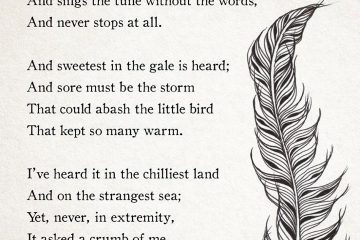Table of Contents
- Exploring the Emotional Landscape of Mental Health Through Poetry
- Transformative Voices: How Poetry Offers Healing and Understanding
- Must-Read Poetry Collections That Illuminate Mental Health Struggles
- The Therapeutic Power of Words: Poetry as a Tool for Self-Reflection
- Finding Connection: Poetry That Resonates with Your Inner Battles
- Q&A
- Wrapping Up
Exploring the Emotional Landscape of Mental Health Through Poetry
Poetry has long served as a bridge between raw emotions and articulate expression, particularly in the realm of mental health. While prose can often dissect the intricacies of mental illness, poetry captures the fleeting moments of despair, joy, and introspection in a way that feels deeply personal. Each line can resonate with readers confronting their own struggles, offering solace and understanding. Notable poets have used their art to delve into experiences of anxiety, depression, and recovery, transforming personal battles into universal truths. Their verses allow us to see our own reflections and feel validated in our often solitary journeys.
Various collections stand out as powerful tools for navigating the complexities of emotional pain and healing. Here are a few notable books that specifically address themes around mental health:
- The Princess Saves Herself in This One by Amanda Lovelace
- This Is How You Lose Her by Junot Díaz
- The Gift of Imperfection by Brené Brown
- Milk and Honey by Rupi Kaur
- Poems That Make Grown Men Cry by Anthony Holden
These poetic works often feature compelling imagery and emotional honesty, inviting readers to traverse the terrains of heartbreak and healing. The beauty of poetry lies in its ability to provide not just a sense of identification with the poet’s experiences, but also a path for exploration and catharsis. As they explore deeply held fears and aspirations, these poets shine a light on the often shadowy corners of mental health, reminding us that vulnerability holds immense strength. By engaging with this emotional landscape, readers can find comfort, inspiration, and perhaps a gentle nudge toward their own healing journeys.


Transformative Voices: How Poetry Offers Healing and Understanding
Poetry has long been recognized as a powerful medium for expression, but its ability to facilitate healing and provide understanding around mental health struggles is particularly profound. The lyrical quality of verse allows individuals to articulate feelings that may otherwise remain trapped within. In a world often dominated by fast-paced communication, the careful cadence of poetry invites readers to pause, reflect, and truly connect with their emotions. Through metaphor and imagery, poets create powerful narratives that resonate, encouraging readers to navigate their own mental landscapes.
Many poets draw from personal experiences when exploring themes of anxiety, depression, and trauma. This authenticity fosters a sense of community and empathy among readers who may feel isolated in their struggles. Collections such as “The Princess Saves Herself in This One” by Amanda Lovelace or “Salt” by Nayyirah Waheed illustrate narratives of resilience and self-discovery. The use of relatable language and raw emotion not only provides comfort but also encourages readers to confront their feelings head-on, promoting a healthier dialogue around mental wellness.
In addition to offering solace, poetry can also serve as a catalyst for change. Many poets advocate for mental health awareness through their work, using their platforms to dismantle stigmas and promote understanding. Notable anthologies, such as “The Poetry of Healing”, compile voices that champion mentalWellness, inviting readers to engage in conversations that matter. By participating in these dialogues, readers not only reflect on their personal journeys but also contribute to a broader cultural shift that recognizes the importance of mental health in our collective well-being.


Must-Read Poetry Collections That Illuminate Mental Health Struggles
In a world where silence often masks the complexity of mental health struggles, poetry serves as a powerful conduit for expression and healing. One stirring collection that stands out is “The Princess Saves Herself in This One” by Amanda Lovelace. Through raw and profound verses, Lovelace navigates themes of self-empowerment and resilience. Her work resonates with readers who find themselves lost in the chaos of their minds, offering solace and a reminder that they are not alone. Each poem is a gentle invitation to reflect on personal experiences, making this collection a must-read for anyone grappling with inner turmoil.
Another remarkable offering is “Nocturne” by Kaveh Akbar, which intricately weaves moments of darkness with glimpses of light. Akbar’s exploration of addiction and recovery unfolds in haunting yet beautiful language, revealing the delicate balance between despair and hope. Readers are taken on a journey through the poet’s own struggles, painted vividly in metaphors and imagery that linger long after the last page. This collection not only sheds light on personal battles but also fosters empathy, fostering a deeper understanding of the complexities surrounding mental health.
For those seeking a more communal experience, “The Art of Drowning” by Billy Collins explores the interplay between humor and sorrow in daily life. Collins’ poems often reflect on existential themes, bringing levity to serious subjects, which can help readers cope with their mental health challenges. His approachable style makes these tough conversations easier, allowing readers to engage with their emotions without feeling overwhelmed. Here are some key themes found in this collection:
| Theme | Description |
|---|---|
| Humor | Using comedy to address serious topics. |
| Existentialism | Reflections on the meaning of life and suffering. |
| Finding Balance | The duality of joy and sorrow. |
These collections manifest not only as forms of artistic expression but also as vital resources for understanding mental health struggles. They can spark conversations and promote healing, showing that sharing one’s vulnerability can lead to connection and understanding. Engaging with poetry, particularly those centered around mental health, becomes not just a literary pursuit, but a pathway to emotional resilience and clarity.


The Therapeutic Power of Words: Poetry as a Tool for Self-Reflection
Words have an unparalleled ability to resonate within us, often unlocking emotions we find difficult to articulate. Poetry, in its essence, is a powerful medium that invites introspection and self-discovery. Through the careful choice of phrases and rhythms, poets delve into the complexities of the human experience, offering glimpses into their struggles and triumphs. This reflective journey can help readers connect their own feelings and situations to the universal themes explored in poetry, allowing for a deeper understanding of mental health.
One of the greatest strengths of poetry lies in its capacity to provoke thought and inspire emotional release. Within verses, metaphors and imagery serve as mirrors, reflecting internal battles and silent screams. As individuals engage with the words on the page, they often find solace in knowing they are not alone in their struggles. Poetry can serve as a catalyst for conversation about mental health, diminishing stigma and fostering a sense of community. Here are a few ways that poetry can aid in self-reflection:
- Emotional Validation: Reading poetry that mirrors personal experiences can affirm emotions and thoughts.
- Perspective Shift: Poets often present multiple facets of a situation, encouraging readers to view their struggles from different angles.
- Encouragement to Write: Engaging with poetry can inspire readers to express their feelings and thoughts through written word, further enhancing self-exploration.
The liberating act of writing poetry can also encourage therapeutic processes. When individuals take pen to paper, they activate creative neural pathways, allowing for catharsis and healing. This process not only fosters personal growth but can create a tangible record of a person’s journey through mental health challenges. Below is a brief overview of how poetry engages different aspects of self-reflection:
| Aspect of Self-Reflection | Poetry’s Impact |
|---|---|
| Understanding Emotions | Facilitates recognition and acceptance of feelings. |
| Cognitive Processing | Encourages mental clarity through structured thought. |
| Creative Expression | Provides an outlet for creativity and personal narrative. |


Finding Connection: Poetry That Resonates with Your Inner Battles
In the midst of life’s chaos and personal turmoil, poetry serves as a sanctuary—an art form that captures the nuances of our struggles in a profoundly relatable manner. Whether grappling with anxiety, depression, or self-doubt, many poets have transcended their own battles through words, creating verses that echo our inner conflicts. Collecting these poignant works can illuminate paths toward healing, revealing how others have navigated the same turbulent waters. Each poem can act as a mirror reflecting our darkest thoughts while simultaneously offering solace and understanding.
Some notable collections resonate particularly well with those who face mental health challenges. Here are a few that have struck a chord with readers over time:
- “The Princess Saves Herself in This One” by Amanda Lovelace – A modern retelling of resilience and empowerment, this collection provides a raw and emotional foundation for those seeking strength.
- “Milk and Honey” by Rupi Kaur – Known for its simplicity and depth, Kaur’s poetry explores trauma, survival, and love, allowing readers to feel connected and understood.
- “The Dark Between Stars” by Atticus Poetry - This work delves into the complicated interplay between heartbreak and healing, showcasing vulnerability with relatable insights.
Many find comfort in poetry not just as a form of expression, but as a means of promoting mental well-being. The act of reading can be restorative, providing a moment of introspection. Additionally, sharing verses with one another can foster connection, breaking the isolation often felt during mental health struggles. By embracing the wisdom within these collections, readers are reminded that they are not alone in their battles; the heart of each poet speaks directly to the essence of human experience, fostering empathy and helping us navigate our journey toward healing.
Q&A
Q&A: Poetry Books About Mental Health
Q1: Why are poetry books effective when it comes to exploring mental health?A1: Poetry can distill complex emotions into vivid imagery and concise language, offering readers a unique lens to understand and process their feelings. The rhythm and cadence of poetry often create a meditative experience, allowing readers to reflect deeply on their mental health journeys. Through shared vulnerabilities, poets can articulate experiences that resonate with readers, fostering a sense of connection and validation.Q2: What themes should I look for in poetry books about mental health?A2: When exploring poetry focused on mental health, pay attention to themes such as anxiety, depression, trauma, resilience, and healing. Many poets weave personal struggles into broader social contexts, addressing stigma and societal expectations. The exploration of self-identity and the quest for solace can also provide profound insights into the mental health experience, encouraging readers to resonate with the themes and draw strength from them.
Q3: Can you recommend a few poetry books that specifically address mental health issues?A3: Absolutely! Here are some powerful poetry collections that delve into mental health:
- “The Sun and Her Flowers” by Rupi Kaur – This collection offers a journey of growth, self-care, and healing, dealing with emotional pain and empowerment.
- “The Girl Who Smiled Beads” by Clemantine Wamariya – Though primarily a memoir, this book includes poetic reflections on trauma and resilience amidst a story of survival.
- “Nocturne” by Tishani Doshi – A poignant exploration of isolation and mental turmoil, Doshi’s work resonates with those grappling with their inner demons.
- “The Dark Between Stars” by Atticus Poetry – Known for relatable themes, Atticus writes about love, loss, and the struggle with mental health in a way that is both comforting and honest.
Q4: How can poetry help someone dealing with mental health issues?A4: Engaging with poetry can be both therapeutic and enlightening for those facing mental health challenges. Writing poetry encourages self-expression, allowing individuals to articulate emotions they may struggle to voice. Reading poetry can also provide comfort through shared experiences, reducing feelings of isolation. The lyrical nature of poetry often helps readers to find new perspectives and coping mechanisms, making it a valuable tool for emotional processing and healing.
Q5: Is there a specific audience that benefits more from poetry about mental health?A5: While anyone can benefit from poetry about mental health, it is particularly resonant for those living with mental health issues, caregivers, and mental health professionals. Young adults and teenagers may find solace in verses that reflect their experiences and struggles, while seasoned readers may appreciate the layered meanings and introspection found within poetic works. Ultimately, the beauty of poetry lies in its universal appeal – it speaks to the shared human experience of navigating life’s complexities.
Q6: How can I start a personal journey with poetry and mental health?A6: Begin by setting aside some time for reflection. Find a quiet space where you can read poetry that resonates with your feelings. Consider journaling your responses to the poems you read, or even writing your own. Explore different styles and voices to find what speaks to you. Joining a poetry group or taking a poetry class can also foster a sense of community and support. Remember, your journey is personal – let the poetry guide you at your own pace.—This exploration of poetry books offers a poignant reminder of the power of words in tackling mental health, ultimately nourishing the soul and encouraging deeper connections with oneself and others.




0 Comments